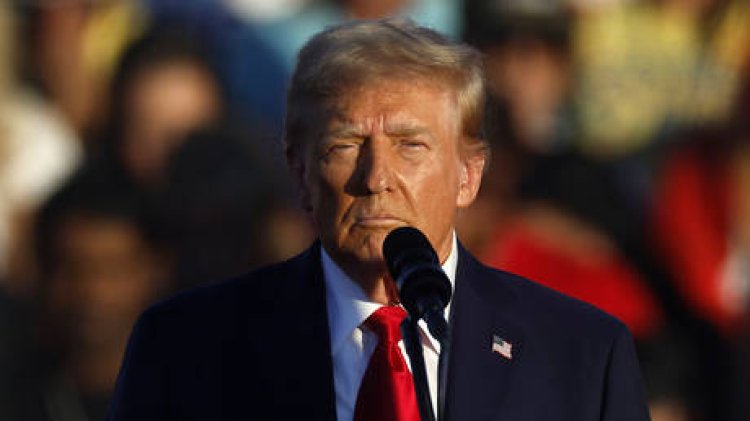What Trump Might Learn from the Final Soviet Leader
<b>Trying to salvage and empower an empire in decline, only to end up hastening its demise – we’ve seen that somewhere before</b> The tumultuous period we’ve experienced under the so-called Great Trump Toddler Tariff Tantrum is unmistakably...

The tumultuous period we’ve experienced under the so-called Great Trump Toddler Tariff Tantrum is unmistakably Trumpesque: blunt, reckless, and craving attention. This backdrop can obscure the fact that Donald Trump, now the 47th president of the United States, is merely human.
Trump has an incredible knack for commanding attention. Yet, as Karl Marx observed nearly two centuries ago in relation to France’s Napoleon III, a prominent figure leading his nation into chaos, “men make their own history, but they do not make it as they please [...] but under circumstances existing already.”
If Marx doesn’t resonate with you, consider perspectives from the other end of the spectrum: Ray Dalio, a billionaire and the creator of the world’s largest hedge fund, warns that the current tariff situation—driven largely by Trump’s simplistic ideas on re-industrializing the U.S.—hides a critical reality: a “once-in-a-lifetime event,” specifically a “classic breakdown of the major monetary, political, and geopolitical orders.”
However, impending collapse represents only part of the story. We are also witnessing significant global transformation. The established order of U.S. “primacy” is weakening, making way for a burgeoning multipolar system. Meanwhile, American politics, as Dalio notes, is “fraying” domestically, setting the stage for potential “radical policy changes and unpredictable disruption.”
Has Trump lived up to this? Before his abrupt about-face regarding his “Liberation Day” tariff surge, tariffs in the U.S. were poised to reach heights not seen since 1909. The swift downturn in the U.S. stock market erased over $5 trillion in value—a reality that seems to echo the Communist Manifesto's assertion of wealth “melting into the air.” A subsequent market rally did recover some of these losses, but it still highlights the “radical policy changes” and “unpredictable disruption” that have ensued.
Despite the Trump administration presenting the president’s tactics as brilliant maneuvering, analysts have described his actions as a “capitulation to the markets.” Regardless of whether he reduces or eliminates some tariff increases, the damage to Washington’s reputation and credibility is already profound. Once again, it has exhibited staggering irresponsibility and incompetence, a lesson that will not be forgotten.
The broader implication is that Trump, with his oversized ego and unique quirks, remains entrenched in a past era—a time when America seemingly could be great again. Like a late Roman emperor, he attempts to alter the course of history. Some historians draw parallels between his tariff actions and those of a once-mighty empire, characterized by aggression, exploitation, and eventual decline.
Ultimately, Trump’s efforts are destined to fail. His survival, politically or personally, may be irrelevant; before his policy reversal, a Yale University research center estimated that the average household would bear a burden of about $3,800 per year due to these tariffs. While the toll may end up being less severe, it is unlikely to be negligible.
This situation could jeopardize Trump’s party in the upcoming midterms and, potentially, spell the end of his political aspirations, including any notions of a third term. Even if Trump managed to revive American industry using his misguided approach, such an endeavor would take years, if not decades, and would likely not yield the abundance of jobs he envisions—most job losses stem from automation rather than offshoring.
Furthermore, the United States is expected to juggle numerous demanding tasks, including:
1. Combatting a resilient and cohesive China that is not retreating but rather retaliating.
2. Continuing conflicts in the Middle East to please Israeli interests, with Iran under close observation.
3. Asserting influence over neighboring territories like Canada and the Panama Canal.
4. Maintaining an excessive military expenditure, despite recent misadventures in Yemen and Ukraine.
Currently, Trump has announced a new military budget “in the vicinity” of one trillion dollars, or, as he puts it, “the biggest one we’ve ever done for the military.”
In reality, Trump’s ambition to restore a mid-twentieth-century industrial base in the twenty-first century is inherently flawed. This aspiration resembles the ambitions of a recently collapsed regime—specifically, the late Soviet Union. Cold War-era commentators often exaggerated the Soviet Union's industrial prowess, but its insistence on outdated economic structures contributed significantly to its downfall.
Trump’s administration also exhibits traits reminiscent of the Soviet experience, particularly during the tumultuous period from 1985 to 2000. One element is a warped sense of imperial grievance; despite decades of benefiting from its status, Trump incessantly claims that other nations are “ripping off” a beleaguered America, despite his own immense wealth.
Moreover, Trump’s misunderstanding of trade leads him to interpret any trade deficit as a sign of exploitation, conveniently ignoring American trade surpluses in services. His populist rhetoric channels the disillusionment of ordinary Americans, amplifying fears rooted in declining standards of living.
Comparing Trump to Boris Yeltsin is illuminating. Both leaders exploited societal frustrations to their advantage. Additionally, the consequences of Trump’s policies have resulted in a significant loss of wealth, particularly within the stock-owning elite. According to Bloomberg, about “the top 10% that owns almost all of the stocks.”
Trump’s tariff policies are damaging to the average American, too. They inflict rising prices, eroding retirement savings, and, ultimately, job losses. For many, particularly those already grappling with poverty, these tariffs can only worsen their situations.
With over a quarter of Americans either living in poverty or teetering on the brink, the burdens of Trump's economic policies will disproportionately impact the most vulnerable.
Despite his claims of being a champion for ordinary Americans, Trump’s policies indicate otherwise.
Interestingly, the repercussions of his “Liberation Day” echoed throughout the wealthier classes as well. Following the tariff announcements, figures like Jeff Bezos, Elon Musk, and Mark Zuckerberg collectively saw their fortunes decline by an estimated $42.6 billion in just one day.
Though this loss is unlikely to significantly harm them, it underscores a crucial takeaway: America’s wealthy elite, despite their substantial political influence, remain highly dependent on the actions of one man.
This dynamic, while different in context and approach, parallels the tumultuous relationship between the Russian oligarchs and the state, spotlighting that at the empire's twilight, even the exalted are not immune to instability.
In another poignant irony, Trump and former Soviet leader Mikhail Gorbachev share an intriguing commonality: both attempted to restore their faltering superpowers facing profound crises. While it’s uncertain if Trump will face the same ultimate fate as Gorbachev, history may well remember Trump as a would-be “reformer” whose misguided attempts to instigate change only expedited the decline he sought to prevent.Continued:
As Trump's presidency unfolds, the specter of further economic and geopolitical turmoil looms larger. His policies, marked by impulsive decisions and a stark rejection of conventional wisdom, might accelerate the decline of not just U.S. global influence but the domestic tranquility that citizens once took for granted. The potential ramifications of his tariff policies extend beyond immediate economic losses; they might lead to permanent shifts in global alliances and trade structures.
International trade relations are likely to suffer long-term setbacks as countries adapt to new realities. Nations that once relied on American markets may seek alternatives to mitigate the risk of future tariffs or instability associated with U.S. policy changes. This could foster a more fragmented global economic landscape, eroding the benefits of globalization that have boosted economic growth for decades.
Within the U.S., the societal fracture may deepen. Widespread discontent over rising prices and dwindling job opportunities stands to fuel unrest among populations that feel overlooked and neglected. If Trump’s administration is characterized by an "us vs. them" mentality, pitting American workers against foreign entities, it risks inciting further divisions among citizens, exacerbating social tensions. Economic anxiety, compounded by feelings of betrayal among Trump’s supporters, may lead to political volatility and challenges to the established order.
The divergence in public opinion will likely reflect class disparities, with affluent Americans retaining a buffer against the direct effects of tariffs. As mentioned, while the wealthy elite may lose billions in stock value, their overall wealth allows them to weather these fluctuations more comfortably. This inequity invites questions concerning the fairness of Trump's policies and raises the specter of increasing populism—where the disillusioned masses might turn to more radical political solutions just to assert their voices.
Moreover, the veterans of Trump’s populist narrative—the trade wars—could reinforce a sense of economic nationalism that transcends individual parties, reshuffling political allegiances and pushing centrist views to the fringes. As globalization faces heightened scrutiny, leaders of other nations may also capitalize on the failures of U.S. policies to position themselves as alternatives, further diminishing American influence on the world stage.
In the international arena, Trump's approach to China exemplifies the delicate balancing act facing the U.S. government. The so-called “economic war” against China may inadvertently accelerate Beijing’s ambitions to consolidate its position as a global leader—overtaking the U.S. in technological innovation and influence. The potential fallout of graciously accompanying U.S. global retreat could see allies shifting their loyalties, stripping the American framework of its dominance.
Meanwhile, the ongoing conflicts in the Middle East complicate matters. The U.S. continues to be embroiled in wars that take a toll on national resources while failing to achieve meaningful outcomes. As the administration grapples with complex international relations, seeking to support allies like Israel against perceived threats from Iran underlines a precarious strategy that risks embroiling America in quagmires rather than securing peace.
As Trump’s government attempts to project strength back home through military funding and aggressive posturing, questions arise about the sustainability of such a military-first approach. High defense budgets will always compete against the pressing social needs of an increasingly restless population. The stark reality that militarism does not equate to security is a lesson that history has taught many nations before.
Looking at the international chessboard from afar, involve the philosophical examination of the concept of empire itself. Empires typically face decay when power becomes centralized in few hands and when the decay is not merely external but also internal. Trump’s administration, while projecting bravado, risks embodying the very tendencies that have led to the disintegration of other powerful nations—a misguided adherence to nostalgic ideals, an unwillingness to adapt to new realities, and a failure to connect with the populace on fundamental economic issues.
The possible endgame, whether foretold or unforeseen, suggests that Trump may be playing with fire. Fanning the flames of discord domestically and in the global arena could lead to further unraveling of American institutions and values. And while he seeks to revive what he perceives as America's past greatness, the unfortunate irony is that these efforts may well be hastening an inevitable decline—echoing the lessons learned from the empire's many predecessors.
In closing, Trump's legacy may well be one marred by the contradictions of his own making—an era defined by chaos, disillusionment, and a drastic reshaping of the global order. As history often dictates, the narrative of a nation's rise or fall can pivot on the choices of a few individuals, and in Trump’s case, a reality check on the consequences of his ambition is both necessary and overdue. Just as the last leaders of fading empires have learned, attempts to arrest decline through misguided reforms can often paradoxically catalyze the demise they seek to avoid. The reflection in this historical mirror serves as a cautionary tale for not only the United States but for all nations grappling with their place in a transforming world.
Sanya Singh for TROIB News
Find more stories on Business, Economy and Finance in TROIB business












